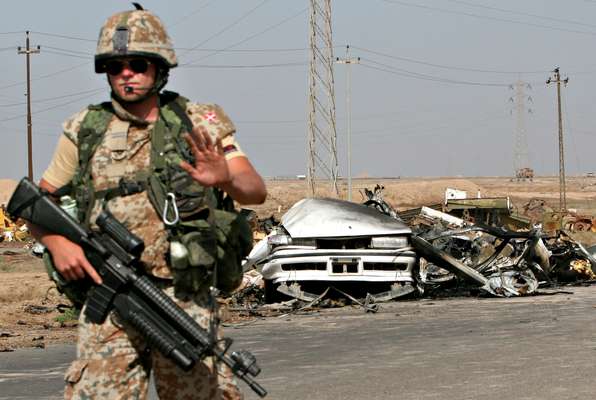Defence / Global
Defence
Briefing
The new hi-tech armoured vehicles destined for US and UK troops in Afghanistan and a new mine-resistant jacket from a Columbian bullet-proof clothing maker. Plus, why back problems are adding to the hardship of life in combat.
Tanked up
USA/UK [AFGHANISTAN WEAPONRY]
The US and UK have embarked on programmes to develop new families of mine-resistant ambush protected (MRAP) vehicles that are light and mobile enough to deal with the haggard terrain and minimal roads of Afghanistan, but protected enough to withstand Taliban attacks, mines and IEDs/roadside bombs. Here’s what they’ve come up with so far.
1. Armour Heavy steel appliqué plate armour has been fitted to a range of light vehicles including US Hummers but if the vehicle is blown over in a blast, crews sometimes can’t open the incredibly heavy doors to escape. New advanced ceramic and carbon composite armour panels can now provide high levels of protection at relatively low weights.
2. Anti-RPG protection
Low tech fence-like outer armour helps protect against rocket-propelled grenades, but only stops about 60 per cent of them exploding. A new option is just entering the field in the shape of a UK-designed textile armour known as Tarian, which doesn’t stick out as far from the vehicle (this is helpful in narrow urban settings), and absorbs the blast rather than preventing it.


3. Jamming devices
Virtually every armoured vehicle in Helmand Province needs a forest of antennas these days, broadcasting electronic countermeasure jamming to prevent Taliban forces from setting off roadside bombs remotely using radios or mobile phones, or to detonate them prematurely at a distance.
4. Seats
Blast protective seats are crucial to help crews remain alive when their vehicle hits back down after being blown up. There is a huge range of seats available suspended from the hull with elastic ropes or fitted with built-in shock absorbers and crumple zones. The latest design from engineering specialist Jankel can automatically detect the size and weight of the occupant to manage how the seat responds to a blast.
5. Weapon station
Where there is no front line, enemy fire can come from any direction, so armoured vehicles have increasingly been fitted with armoured cupolas to protect the gunners standing up in the back. Remote weapon stations – deployed outside the vehicle and controlled from within – are proving an even safer option.
6. Mobility
Afghanistan’s hardcore offroading has driven the adoption of advanced independent suspension systems with rugged adjustable ride heights. Some new vehicles are being developed with all-wheel steering to help them get over and through obstacles. Most vehicles’ wheel stations and engines are designed to come off and be easily replaced in the field.
Mine boggling
Colombia [CLOTHING]
In a country with one of the highest numbers of landmine victims in the world, bulletproof clothing specialist, Colombian Miguel Caballero, has designed an anti-mine suit he claims can withstand improvised explosive device explosions and most landmines. Seven years in the making, weighing just 7kg and 1.5cm thick, the anti-flammable, three-layer suit is made from material similar to that used by NASA in space suits. The Colombian military have been using 46 of the suits since last December. But experts are sceptical: “It sounds unrealistic in humanitarian demining,” says Andy Smith, head of NGO No More Landmines.
Fitness first
Denmark [ARMY HEALTH]
A staggering 10 to 15 per cent of the Danish infanteers deployed with the International Security Assistance Force in Afghanistan are suffering lasting disability caused not by enemy action but the huge equipment and stores loads that they are expected to shoulder, according to Colonel Eigil Schjønning, commander of the Danish Army Combat Centre.
It is common to have soldiers carrying belt kit, weapon, body armour, ammunition and packs totalling up to 70kg and Schjønning says that many soldiers are dealing with it by taking painkillers daily. In a drive to overcome this, he told the WBR Soldier Technology conference in London that two new major recommendations from the Combat Centre were to redesign the 12-month infantry physical fitness training and conditioning regime and secondly to deploy physiotherapists – who are already stationed at field hospitals – at forward operating bases.
Heavy metal
Israel
Commercial airliners operated by Israel’s state-run airline El-Al are to be fitted with a new self-defence system to protect them from heat-seeking missiles. The system, called C_MUSIC, blinds oncoming missiles by firing a laser into their infrared seeker.


